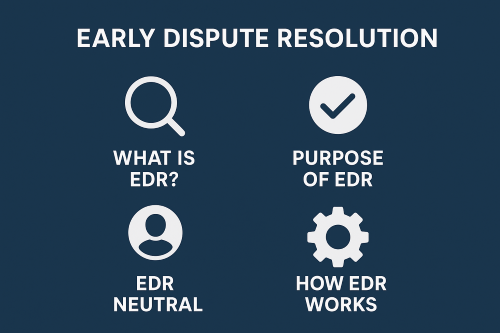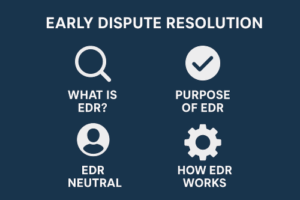
Blog
Early Dispute Resolution Saves Time & Money

 Settling disputes through litigation or arbitration is often costly, both in terms of money and time spent dealing with attorneys and courts. Expenses when requesting, reviewing, and sorting documents; court costs like filing and motion fees; and possibly additional fees for the losing party all add up. In many cases, these costs can exceed the initial dispute amount, even without accounting for any other costs. Litigation, for example, can also have further reaching impacts on your business, difficulty finding new work while dealing with legal issues and losing relationships with opposing parties can often diminish expected future revenues. This is where Early Dispute Resolution (EDR) can be a boon for those who want to avoid the more intensive and costly litigation in favor of a more streamlined alternative.
Settling disputes through litigation or arbitration is often costly, both in terms of money and time spent dealing with attorneys and courts. Expenses when requesting, reviewing, and sorting documents; court costs like filing and motion fees; and possibly additional fees for the losing party all add up. In many cases, these costs can exceed the initial dispute amount, even without accounting for any other costs. Litigation, for example, can also have further reaching impacts on your business, difficulty finding new work while dealing with legal issues and losing relationships with opposing parties can often diminish expected future revenues. This is where Early Dispute Resolution (EDR) can be a boon for those who want to avoid the more intensive and costly litigation in favor of a more streamlined alternative.
What is Early Dispute Resolution (also known as EDR)?
Early Dispute Resolution is a method that works to settle disputes before legal processes take on substantial amounts of time and money. It is a proactive approach with the purpose of distilling the dispute down to focal problems and deciding appropriate payouts needed to resolve said disputes.
What is the Purpose of Early Dispute Resolution?
EDR works to simplify the broader issues into concise goals that allow for representing attorneys to efficiently gather sufficient information on the issues faced by their clients. This information is then used to evaluate the client’s situation and accurately estimate settlement amounts
Who is the Early Dispute Resolution Neutral?
The neutral is an important aspect in ensuring that dispute resolutions are efficient. They act as an unbiased 3rd party who facilitates fair interaction between the disputing parties. Similar to a mediator, a vast majority of shared communication should flow through the “neutral”. They ensure that fair practices are upheld by preventing unnecessary/irrelevant requests, maintaining decorum between parties, facilitating timely responses, discouraging responses filled with useless documents, etc. Through all of these practices, the neutral is able to reduce costs and time spent acquiring and sorting data received from the opposing party. Click here to see a list of EDR Neutrals from the Georgia Center for Arbitration and mediation!
How Does Early Dispute Resolution Differs from Mediation:
While so far this may sound like a simple mediation, the primary differences lie in the time frame of dispute resolution and the structure provided by EDR. First, EDR is able to capitalize on the fact that it is typically handled at the beginning stages of a dispute, allowing for resolution before costs add up. Second, a framework of rules allows for a smooth and comprehensive path to resolution.
How Does Early Dispute Resolution Work?
EDR follows a four step structure that allows for both parties to strip away much of the noise that can arise from traditional methods of dispute settling. These steps aim to focus the EDR process on obtaining “Sufficient Information” for both parties to make informed and educated decisions throughout the resolution process
What Steps Typically Occur During Early Dispute Resolution?
Step 1 – Initial dispute assessment:
The initial dispute assessment phase focuses on discovering the primary issues that the broader dispute relies on. Presumably, once these issues are solved, the whole of the dispute is resolved. The dispute assessment itself contains the gathering of material facts, determination of core claims and defenses, pertinent documents to establish sufficient knowledge required to make informed decisions, finally, the question of whether an expert would be beneficial to assist in the matter is decided.
Step 2 – Information and Document Exchange:
Skilled lawyers are often able to separate the useful information to a case and the unimportant documents that are often provided when information is requested from the other side. This often takes up a substantial amount of time when combing through a mountain of provided documents to find information relevant to the dispute. EDR is able to remedy this problem by utilizing the neutral, ensuring that all information requested and received is of importance and relevance to the matter at hand
Mutual Trust between Parties is an Important Part of EDR: By default, the information shared throughout the dispute resolution is kept off the record, however, honesty is of paramount importance when engaging in EDR. Each party retains the right to withdraw from the resolution process at any time that they feel the opposing party is being dishonest.
During information exchange in Step 2, a requesting party has the option to ask the responding party to declare a Compliant Response. The response claims that the providing party has made a good-faith effort to provide documents that meet the whole scope of the requested documents, it also states that the information provided was not knowingly untrue or inaccurate.
If a settlement is reached in EDR which is backed by the declaration of Compliant Response, discovery of dishonesty during the EDR can breach the Compliant Response. This can nullify the settlement and even lead to the breaching party being faced with “Fraud in the Inducement.”
Step 3 – Calculation of Risk-Adjusted Value
When deciding appropriate settlement amounts for any given party during any type of dispute resolution, it is important for attorneys and clients to come together and create Risk-Adjusted values for their dispute. The primary purpose of Risk-Adjusted values(RAV) is to create reasonable and attainable values for the purpose of reaching a compromise. Ultimately, RAVs boil down to answering the question “Where can I expect to settle?” Unfortunately, this answer is often less desirable than where you would like to settle. Even an undesirable value can provide advantageous in the long run by saving costs that would otherwise be incurred if the dispute continued.
Some common practices when calculating RAV is to use a Lo-Mid-Hi approach which is to determine the amounts of a low payoff, a medium payoff, and a high payoff. When you have gathered these numbers, you associate a probability of ending up with these outcomes. When multiplying these probabilities by the amounts and adding up the result for all possible outcomes, you will end up with an expected value. For example:
46% of settling at $100,000
35% of settling at $250,000
19% of settling at $500,000
(.46)($100,000)+(.35)($250,000)+(.19)($500,000) = EV of $238,000
This is a good baseline to go off of, however, it is not simply as cut and dry as this. Proportions and amounts will constantly change based on a plethora of applicable factors, including but not limited to: ability of opposing party to pay, outstanding debts, probability of losing the case, risk tolerance, future costs, etc.
Step 4 – Resolution
Using your RAV (Step 3) a settlement is hopefully able to be negotiated between the parties. If a settlement is not met, typically a mediation is scheduled with the neutral acting as the mediator. This allows for quicker communication between the two parties in a blocked out time where full focus can be applied to reaching a settlement.
In the event that the parties involved are still unable to find a settlement, EDR still provides benefits that may have not been found elsewhere. In concurrent mediation sessions, or even in a court proceeding, relevant documents provided throughout EDR are still readily available to both parties. Also, the primary issues have already been discerned, lessening the scope of dispute and shortening the time it takes to prepare for future proceedings. There is also greater success when dealing with mediation following EDR, as you will have the options to agree with the best way to move forward as well as engaging in further document discovery to find out where any impasses lie.
Conclusion
Early Dispute Resolution offers a practical, cost-effective way to resolve conflicts before they escalate into lengthy and expensive litigation. By focusing on structure, transparency, and efficiency, EDR enables parties to reach fair settlements while preserving business relationships and minimizing disruption. For professionals and organizations facing disputes, exploring whether EDR is the right approach can be a strategic step toward protecting both financial and reputational interests. For further information or questions about how EDR can help you, feel free to reach out to our offices at:
South Georgia Office – (229) 226-4818
Atlanta Office – (404) 446-0575

